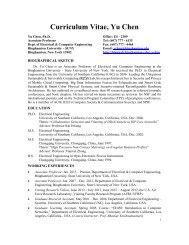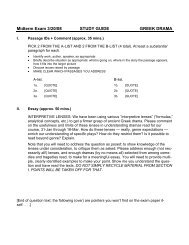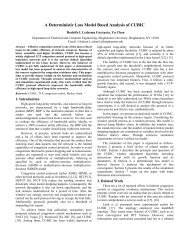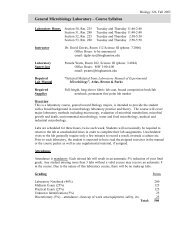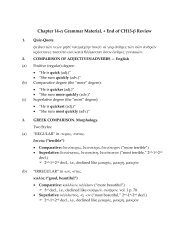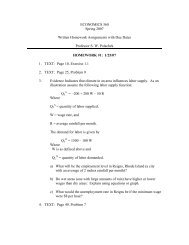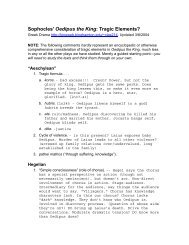Aristotle Poetics - Harvey.binghamton.edu
Aristotle Poetics - Harvey.binghamton.edu
Aristotle Poetics - Harvey.binghamton.edu
You also want an ePaper? Increase the reach of your titles
YUMPU automatically turns print PDFs into web optimized ePapers that Google loves.
<strong>Aristotle</strong> <strong>Poetics</strong> 2<br />
rhythms of his attitudes, may represent people’s temperaments (ethe), 7 as well as what<br />
they do and suffer. There is further an art which imitates by language alone, without melody,<br />
in prose or in verse, and if in verse, either in some one or in a plurality of meters. 8<br />
This form of imitation is to this day without a name. 9<br />
10<br />
20<br />
[You can skip this bracketed section. We have no common name for a mime of Sophron<br />
or Xenarchus or a Socratic Conversation; and we should still be without one even if the<br />
imitation in the two instances were in trimeters or elegiacs or some other kind of verse—<br />
though it is the way with people to tack on “poet” to the name of a meter, and talk of elegiac-poets<br />
and epic-poets, thinking that they call them poets not by reason of the imitative<br />
nature of their work, but indiscriminately by reason of the meter they write in. Even<br />
if a theory of medicine or physical philosophy be put forth in a metrical form, it is usual<br />
to describe the writer in this way; Homer and Empedocles, however, have really nothing<br />
in common apart from their meter; so that, if the one is to be called a poet, the other<br />
should be termed a physicist rather than a poet. We should be in the same position also, if<br />
the imitation in these instances were in all the meters, like the Centaur (a rhapsody in a<br />
medley of all meters) of Chaeremon; and Chaeremon one has to recognize as a poet. So<br />
much, then, as to these arts.]<br />
There are, lastly, certain other arts, which combine all the means so far mentioned:<br />
rhythm, melody, and verse. Thus we have dithyrambic and nomic poetry, 10 tragedy and<br />
comedy; with this difference, however, that the three kinds of means are in some of them<br />
all employed together, and in others brought in separately, one after the other. These elements<br />
of difference in the above arts I term the means of their imitation.<br />
2<br />
What the imitator [i.e., the poet] imitates are actions. These doers of the action are necessarily<br />
either good people or bad—the diversities of human temperament nearly always<br />
stemming from this primary distinction, since the line between virtue and vice is one dividing<br />
the whole of humanity. It follows, therefore, that the people being represented<br />
must be either above our own level of goodness, or beneath it, or just such as we are. 11<br />
7 For the sake of clarity, “temperament” and “inner qualities” will translate ethos;<br />
“character” will mostly refer to persons represented in drama or literature, and only<br />
sometimes to inner nature or qualities.<br />
8 Meter: measured rhythmic patterns in a poem; how rhythmic elements are<br />
grouped together into units—feet, lines, groups of lines (strophes). E.g., Shakespeare’s<br />
iambic pentameter is a meter or measure consisting of five iambic “feet” (five ta-DÁHs)<br />
per line: “To bé | or nót | to bé | that ís | the quéstion.” Greek poetry used meter; it did not<br />
use rhyme. Note that ancient drama was all in verse form, i.e., in meter.<br />
9 <strong>Aristotle</strong> refers on the one hand to prose (i.e., non-metrical) discourse, on the<br />
other hand, to spoken (i.e., not sung) verse, including epic, elegiac, and iambic.<br />
10 Nome (whence “nomic”): solo song honoring Apollo; sung to the lyre.<br />
11 There is some ambiguity about what <strong>Aristotle</strong> means by “good” (spoudaios) and<br />
“bad” (phaulos). I.e., it is hard to tell if he means superior/inferior/etc. morally, or in<br />
terms of social class or status (gods/kings/heroes versus slaves/lowlifes/etc.). spoudaios




